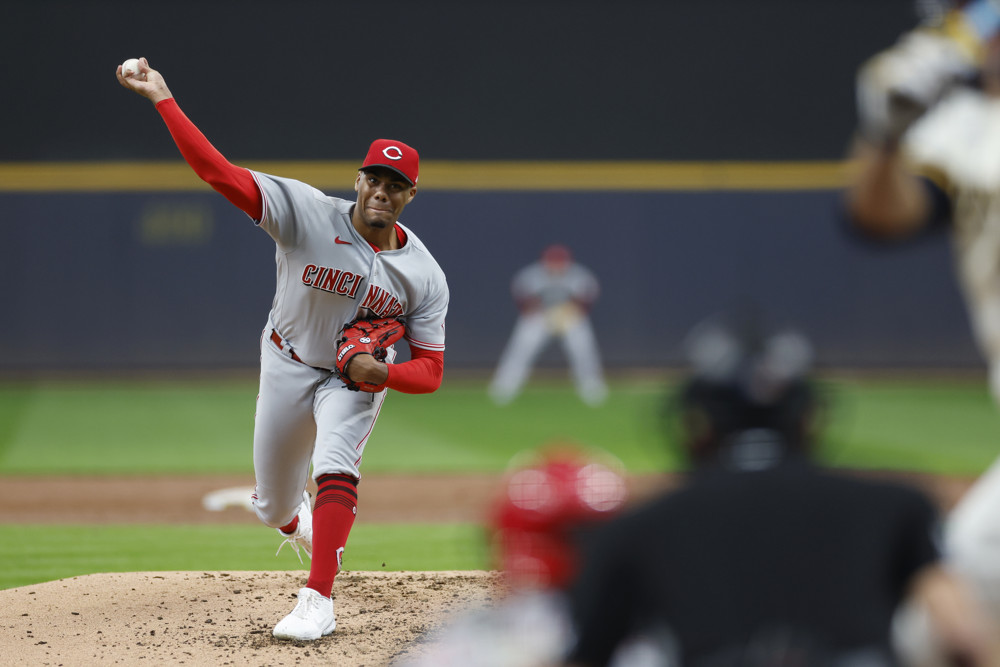
The Reds have signed blossoming star pitcher Hunter Greene to a six-year, $53 million extension with a $21 million club option for a seventh year. The news was initially announced by ESPN’s Jeff Passan and has since been confirmed by the team.
HG EXTENDED
#Reds RHP Hunter Greene has signed a 6-year contract extension through 2028, with a club option for 2029. pic.twitter.com/gYSn7BTwGg
— Cincinnati Reds (@Reds) April 18, 2023
It’s the first contract extension the Reds have given out since signing Sonny Gray to a three-year, $30 million deal following a trade from the Yankees in January 2019. The Greene deal keeps the game’s hardest-throwing starting pitcher in Cincinnati through at least the 2028 season and through 2029 — his age-29 season — if his option gets picked up. Essentially, the deal buys out Greene’s arbitration years and makes him a Red for up to two additional years. The 23-year-old would have been a free agent following the 2027 season.
Here are the year-by-year specifics of the deal from MLB.com’s Mark Feinsand:
Here’s the breakdown of Hunter Greene’s extension, per source:
$2 million signing bonus
2023: $1 million
2024: $3 million
2025: $6 million
2026: $8 million
2027: $15 million
2028: $16 million
2029: $21 million club option; $2 million buyout— Mark Feinsand (@Feinsand) April 18, 2023
According to The Athletic’s C. Trent Rosecrans, the deal contains “escalators” for the 2028 and 2029 seasons that could bring the contract value in excess of $95 million. The New York Post’s Jon Heyman reports that the deal could max out at $96.2 million. It’s the largest contract the Reds have ever given to a pre-arbitration player. The deal is reminiscent of the one the Braves gave to their young superstar pitcher, 24-year-old Spencer Strider. Atlanta signed Strider to a six-year, $75 million extension with a $22 million club option for a seventh season.
As the Reds look to build around a nucleus of young talent, Greene is now the club’s first player with a guaranteed contract beyond the 2023 season. The rest of the roster consists of pre-arbitration players, free agents, and players with contract options for 2024.
After making the Reds rotation at age 22 last season, Greene’s big-league career got off to an up-and-down start. He flashed brilliance at times, including 7.1 no-hit innings against the Pirates on May 15. He also struggled with the home-run ball for much of the first half of the year, giving up 22 dingers in his first 79.1 innings. Although he missed a month-and-a-half with a sore shoulder, he put together a stretch of dominance in the second half of 2022. Over his last 46.1 innings, Greene had a 1.75 ERA, 2.12, FIP, 2.74 xFIP, 35.9% strikeout rate, and 8.2% walk rate. He also allowed only two home runs over that stretch. Greene gave up only two runs combined in his final five starts.
Greene was given the starting nod on Opening Day this year, making him the youngest Reds pitcher to earn that honor since Frank Pastore in 1980. Through his first four starts of 2023, Greene has a 4.24 ERA — but a lot of that is due to an inflated .413 batting average on balls in play. The peripherals are much more promising, as he holds a 3.31 xERA, 2.50 FIP, and 3.60 xFIP. Greene also has the third-highest Stuff+ among starting pitchers this year, trailing only Jacob deGrom and Shohei Ohtani.
Now, we’ll get to see that nasty stuff for at least the next six years. While it’s a bit of a risk to give a large extension to a player with barely over a year of service, the Reds are betting on Greene’s obvious talent to continue developing in the coming months and years. Remember, he’s still just 23 years old — younger than Nick Lodolo and Graham Ashcraft (both 25). The annual value of his extension won’t be much more than Greene would likely earn in arbitration, assuming he continues to develop. For a reference point, Ohtani got the largest-ever arbitration salary this season at $30 million. Meanwhile, Greene doesn’t have to deal with arbitration at all during his big-league career and gets some significant financial security.
And hopefully, the deal a sign that ownership will be willing to invest in and around its young core in the coming years.
Featured photo by Joe Robbins/Icon Sportswire


